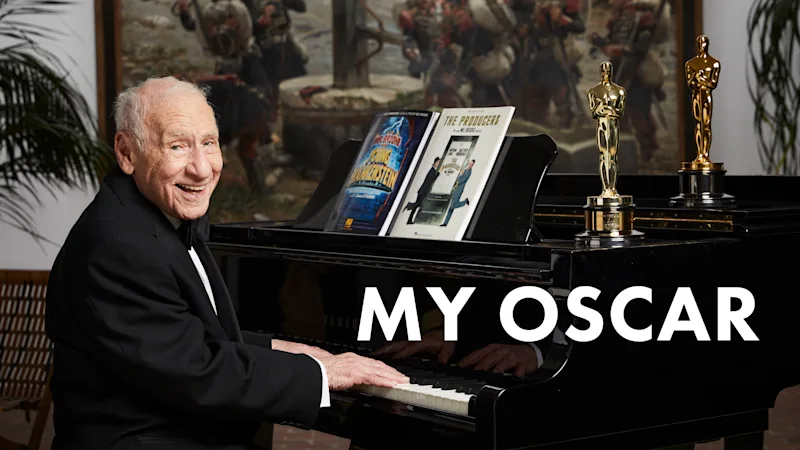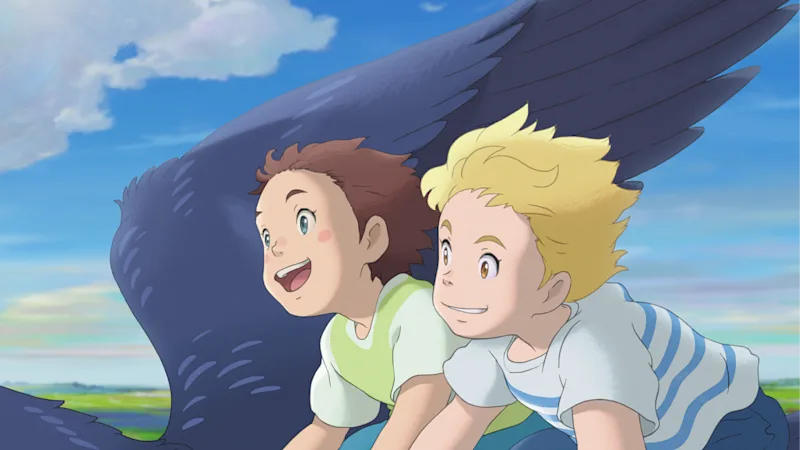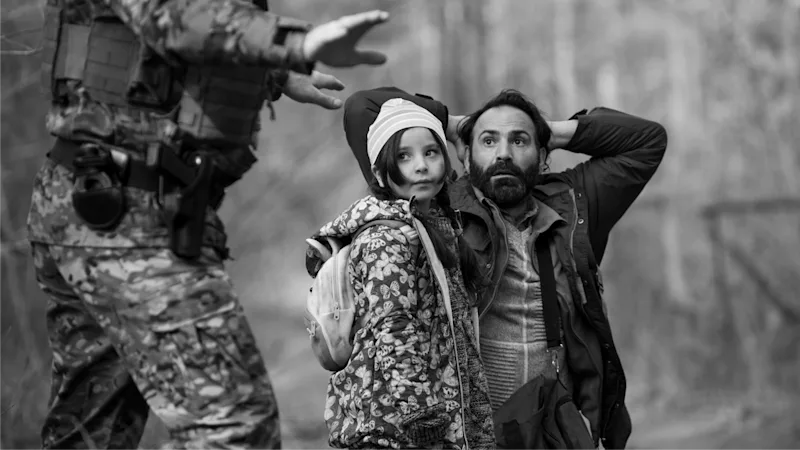When Oscar-winning composer Ludwig Göransson began to work on the score for Christopher Nolan's ambitious biopic, Oppenheimer, his marching orders were simple. "Chris told me, 'I don't really know where we're going to go with this, but I think you should experiment with the violin,'" Göransson recalls.
The Swedish composer took Nolan's words and ran with them, crafting a soundtrack that is heavy on strings and which sounds just as frenetic, relentless, and haunting as the film it accompanies. "When I read the script, I realized from the get-go that the music needed to take the audience into the emotional core of Oppenheimer himself," Göransson says. That required the composer to go there too. "I had to go to some uncomfortable places to try to get the music out."
Oppenheimer explores the life of theoretical physicist J. Robert Oppenheimer (played by Best Actor in a Leading Role nominee Cillian Murphy) both before the invention of the atomic bomb and after he'd come to regret the role that he played in its creation. Beyond being psychologically immersive, Göransson wanted the score to be more expansive and multifaceted than any of his works thus far.
"We focused a lot on making it as dynamic as we could," he tells A.frame. "Sometimes, the film's themes are played with a single instrument. In the scene when Oppenheimer teaches his first class, for instance, he has one student at first, so there's just one violin playing. When he has four students, four violins come in. When the whole class comes in, the whole string orchestra comes in... We really had the time to draw on everything and lean into the push and pull of the story."
Göransson won the Oscar in 2019 for scoring Black Panther, and received another nomination for its sequel, Black Panther: Wakanda Forever. At the 96th Oscars, he won his second Oscar for Best Original Score, amongst Oppenheimer's seven total wins. "To the extraordinary musicians who believed in this score and poured so much of themselves into the process: Thank you," Göransson said of the recognition. "I share this honor with all of you."

A.frame: What was the first piece you composed for Oppenheimer?
The first piece I composed was an experiment with my wife, Serena. She's a violinist, and we spent endless hours in the beginning just doing microtonal glissandos up and down for hours. We spent a whole day in the studio doing that. By the end of it, we were so tired of music and about to go home, and then I got this idea for this simple melody. It had a very simple bass line under it, and Serena heard it and she started playing it with this incredibly intimate, beautiful tone. When she did that, I said, "This sounds so special," so we recorded it and I sent it to Chris. He immediately called me and was like, "That's Opp's theme." We use it throughout the movie in so many spots and in many different settings — sometimes with horns, sometimes with the violin, and sometimes with synthesizers.
Musically, the film feels both modern and classic at the same time. Did you look to anything outside of the film's script for reference as you were composing, whether it be certain albums, songs, or another composer's work?
The only piece of music that was in the script, in fact, was "The Rite of Spring," because it's also in the movie. Oppenheimer puts on that record during the "Can You Hear the Music" montage. Chris wrote it in the script and I was like, "What the f**k?! Do you really have to put that in there? It's like the best piece of music that's ever been written!" [Laughs] He immediately set the bar very high and then just laughed at me when I said that to him. But I ended up listening to that music a lot. My son was two years old at the time, and he'd actually just watched Fantasia. That also has "The Rite of Spring" in it, so it was on all the time. We played it over and over. I listened to the whole piece like three times a day.
The movie doesn't ever slow down — not really — and the same goes for its score. How difficult was it to compose music with that pace in mind?
It was challenging, because it's a long movie and there are a lot of emotions and themes that needed to be covered. There's a big swirl of emotions going on in it. Obviously, it's a challenging task to write music for something like that, but Chris is such a big part of it, and he pushes me and I push him. Music is so important to him, and he was communicating with me from day one. Basically right after I read the script, we started writing ideas, and then I write about five minutes of music every week, and we meet up once a week and listen to it together. We talk about the sounds and what's going on in the music. We talk about the themes and start building our sonic world for the film.
When he starts shooting, he already has two hours of music. When Jennifer Lame starts cutting the movie, she's already putting my music into the cut, and that's very helpful to see. It provides a roadmap of the movie and the music in it and what Chris wants it to be. I'm always writing themes for the characters, but it's all about getting the film's score as close as I can to Chris' vision. To have him and Jennifer immediately give me that kind of roadmap of where and how things are supposed to sit in the film is very helpful.
You mentioned that Jennifer Lame incorporates your music into her cut. When you're working on the film, is she somebody that you're actively conversing with as well?
In pre-production, it's just Chris, but in post-production, it's Chris and Jennifer, because they're always together. So, when I get to the studio and I have a meeting with them, or I watch what they've been doing, it very much ends up being a conversation between the three of us. That's how they work together. Whenever I see the first cut of a movie, there are always going to be scenes where I'm left in awe of how they used some of my demos. It's always like, "Oh, I would never have thought to put that there! That goes against everything I think a film score is meant to do," and that's great! There are usually spots where I think one cue works, but I also know that I can do something better and I want to push things a step further. Chris, to his credit, is always open to that.
For the whole courtroom-driven third act, Chris asked me to write 30 minutes of action music. That immediately felt like an interesting approach, but at first, I didn't write any of that music to picture. Chris' plan was, "We're going to start cutting the courtroom scenes together. Just write 30 minutes of music and make it as nail-biting and fast-paced as you can, like you would for an action scene." I did that, and then I sent it to him. He and Jennifer tweaked it and put it into their cut, and then they sent me what they'd done. I retailored the music to the picture then, and it's just a constant back and forth like that throughout post-production.
Was there any section that proved particularly difficult to figure out musically?
The scene that took the longest to figure out and to write the music for was the scene after the Trinity Test, when he gives a speech in front of his whole team. I remember reading that scene in the script, and the emotions in it are so complicated. It took a long time to find it within myself and go there. It was difficult. It wasn't until the last day of dubbing that we figured it out. That's how long we kept working at it. The thing about that scene is that it starts out almost like a horror movie. Everything is shaking and there's all of this noise, and then Oppenheimer goes in and this music starts to sneak in underneath it all, and it's the theme I wrote for when he goes to Los Alamos for the first time. It's the moment when he's in the tent and his brother is there and you see all the stars and the black hole and the stars get swallowed up by it all.
I had written this piece of music for that scene that's very kind of synthetic. It's these synths that feel like they're drawing everything down to the depths. It communicates this sense of impending doom, so I ended up going back to that feeling for the speech scene. I put horror strings on top of that original piece and then went back to those synths and just kept working them until it felt like they were pulling you down to the bottom of a hole.

Tenet was the first film score you composed for Chris. How did your relationship with him evolve on Oppenheimer?
I was definitely nervous in the beginning just to meet him. I was a huge fan of all the movies he'd done, as well as the music of his films, including everything that Hans Zimmer and David Julyan did with him. Hans' scores for Chris' films really influenced the entire music scene for 10 years. Everyone tried to sound like that, and everyone tried to make movies like Christopher Nolan for a while. I had and still have tremendous respect for that and the mark they made together, but I also knew that Chris wanted to work with me because of what he felt I could bring to the table. I was very nervous about my first meeting with him, but we immediately hit it off. It didn't take long before I knew that he trusted me and I knew that I could show him everything I had.
For Oppenheimer, the difference really was that, because we'd already worked together, I didn't feel nervous at all. I could be experimental right from the beginning, because I knew how open Chris is. So, I brought all of my ideas, even if I thought they were s**ty. He'll still sometimes find a little golden nugget that he can use, or we'll just joke about how bad of an idea it may have been. There's a real openness in our partnership.
What was your reaction to seeing the finished film for the first time?
I can't even describe that, because it was such an out-of-body experience. That was the first time I got to see how they'd really decided to use the music that we'd worked on and see how it was all put together. It's usually not until the second time I see a film that I can fully realize what's going on in it, what it's about, and move my attention away from the musical part of it. With Oppenheimer, I was just completely surprised. When I read the script for the first time, I got almost the exact same feeling as I do now from the film. Chris even wrote sound design details in his script. The foot stomps in the post-Trinity speech scene are in there, and so are the 10 or 20 seconds of silence immediately after the bomb is dropped. Those details are in the script, and it was just so cool to see how he was able to capture all of that perfectly on-screen.

Musically, were there any parts that you thought came together better than even you'd expected?
Definitely. It actually wasn't until I saw the movie again recently that I realized how the music at the end of the film relates to the music in the opening montage. Toward the end of that opening montage, he's in bed seeing all those swirling molecules. He's in his early 20s and has this beautiful dream where he sees these visions and everything's spinning around, and it ends with this positive bit of inspirational, uplifting music. The ending of the film is cut almost the same way as the opening montage, but instead of just visions in his head, we see reality as we know it. We see the rockets and him sitting in an airplane and then it goes back to his eyes again, and you see the whole world collapsing. The same piece of music is used that is in the opening montage, but it's just a little bit different, and I was really struck by how dark the music suddenly feels in that moment.
Chris' movies always make an impact, but what has it been like to see Oppenheimer be embraced in the way that it has?
It's been crazy. It's not often in your career that you get to work on something that everyone sees, and then, after they see it in the theater, they go home and still want to stay in the film's world and want to listen to the music. I was shocked and happy to see how many people actually connected to this film. I would never have thought it'd get such a massive reaction. Now more than ever, I don't know if it's because I'm older or what the world is like now, but I never really know where the pendulum's going to swing. Definitely not with music, at least. When an album comes out or you release a song, musicians are always like, "Are people going to like this? Is this going to be a hit?" You never have any idea, and I feel the same way about the films I work on.
Obviously, with Oppenheimer, I knew that we created something incredibly special. Everyone put a lot of time and effort into it, and I thought it was incredible. But you never know what's going to happen, so it was such a pleasant surprise to see it be received so well.
By Alex Welch
This article was originally published on Feb. 29, 2024.
A.frame, the digital magazine of the Academy, is excited to celebrate and honor the nominees of the 96th Oscars across several branches by spotlighting their nominated films, craftsmanship, and personal stories. For more on this year's nominees, take a look at our Oscars hub.
RELATED CONTENT:
GALLERY: 96th Oscars Winners Portraits (Exclusive)
For Jennifer Lame, the Best Compliment Is Hearing 'Oppenheimer' Didn't Feel 3-Hours Long (Exclusive)
'Oppenheimer' Cinematographer Hoyte van Hoytema on Breaking the Boundaries of Reality (Exclusive)







